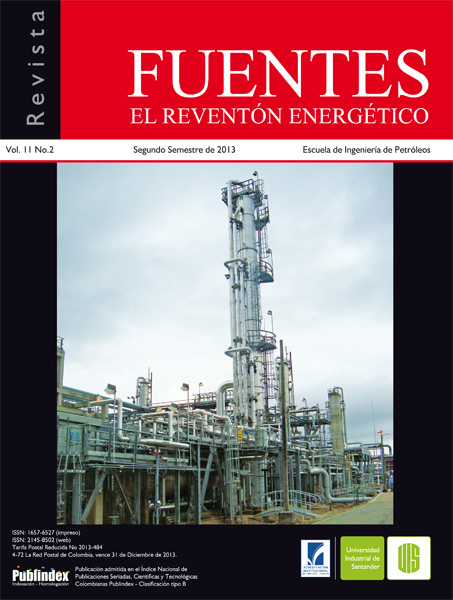Publicado 2013-12-23
Palabras clave
- Rompedores,
- enzima,
- DnS,
- fluido de fractura,
- control de calidad
- polímero ...Más
Cómo citar
Resumen
Una nueva metodología basada en el método del ácido dinitrosalicílico – DNS– fue desarrollada y aplicada para cuantificar de manera directa la eficiencia de los rompedores de fluidos de fractura base agua. Rompedores de diferentes compañías de servicios y una enzima comercial específica para la goma guar y sus derivados, usada por primera vez como rompedor, fueron evaluados. Los rompedores fueron ensayados a 70 y 100°C y a las concentraciones recomendadas por las empresas de servicios. La enzima fue evaluada a 100°C y con diferentes concentraciones de metanol en solución.
La nueva metodología desarrollada demostró ser fácil de aplicar, eficaz y económica para determinar la capacidad de los rompedores para degradar el polímero de los fluidos de fractura base agua.
Descargas
Referencias
2. HOEMAN K., KLASNER S., and KARCHER a. “Method for identification and analysis of Poysaccharide-Based, Hydraulic Fracture Flowback Fluid”. Paper SPE 141146, presented at the international Symposium on Oilfield Chemistry held in The Woodlands, Texas, uSa. 2011.
3. BRANNO H., and JOE Pin R. “Characterization of Breaker Efficiency Based upon Size Distribution of Polimeryc Fragments Resulting from Degradation of Crosslinked Fracturing Fluids”. Paper SPE 36496, presented at Society of Petroleum Engineers Annual Technical Conference and Exhibition, Denver. 1996.
4. WiEnTJES R. H., DuiTS M. H., BaKKER J. W., JONGSCHAAP R. J., and MELLEMA J. “Linear viscoelastic Behavior of Enzymatically Modified Guar Gum Solution: Structure, Relaxations and Gel Formation”. Macromolecules. 2001, vol 34, p. 6014-6023.
5. WiEnTJES R., DuiTS M., JOnGSCHaaO R., and MELLEMA J. “Linear Rheology of Guar Gum Solutions”. Macromolecules. 2000, vol 33, p.9594-9605.
6. HaRRiS P. C., and SaBHaPOnDiT a. “Chemistry Applied to Fracture Stimulation of Petroleum wells”. Paper SPE 120029, presented at the 2009 SPE Middle East Oil and Gas Show and Conference held at Bahrainm, Bahrain. 2009.
7. DUXENNEUNER M. R., FISCHER P., WINDHAB E., and COOPER W. J. “Extensional Properties of Hydroxipropyl Ether Guar Gum Solutions”. Biomacromolecules. 2008, vol 9, p. 2989- 2996.
8. MILLER G. L. “Use of Dinitrosalicylic Acid Reagent for Determination of Reducing Sugar”. Analytical Chemistry. 1959, vol. 31, No. 3.
9. AL-MOHAMMED A. M., NASR-EL-DIN H. A., AL-FUWAIRES O.A., and AL-AAMRI A.D. “Degradation of High pH Borate Gels”. Paper SPE iPTC 11585, presented at the international Petroleum Technology Conference held in Dubai, U.A.E. 2007.
10. aRMSTROnG C. D., STEvEnS R. f., Le H., and STEPHEnSOn C. “The next Generation of Regenerative Catalytic Breakers for Use in Alkaline and High-Temperature fracturing fluids”. Paper SPE 127936, presented at Society of Petroleum Engineers International Symposium and Exhibition on Formation Damage Control, Lafayette, Louisiana. 2010.
